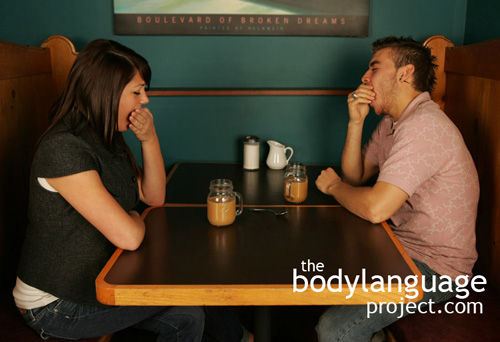While the cue can be done without glasses, peering over them by slightly pulling them down as if to get a better view is even stronger. A friend of mine who is a photographer explained to me that he felt turned off by a client that habitually held this posture. For whatever reason, it was her natural tendency to tilt her head back and look down the bridge of her nose at the camera. Since the nose and chin move together they both signal the same sort of high confidence dominant signal. At the time he didn’t know why but was quick to have the model drop this posture because it didn’t feel right to him. I explained to him that he likely felt put off by the posture because it made her appear dominant and authoritative when he was likely looking for a coy pose instead. I was right after all. His reply “Why would anyone want to look at a domineering model peering down on her subjects?” He then explained that he wasn’t doing a stock photo for a fluff editorial, rather “She wanted to look attractive for her boyfriend!” We both found this amusing; he would have received an interesting surprise!
Tag Archive for Natural Tendency
The Benefits Of Subconscious Mirroring
by Chris Site Author • March 5, 2013 • 0 Comments
The more attention we give to an action during observation, the more likely we are to copy the behaviour. Take traveling abroad, for example, where a constant exposure to accents eventually sees us adopting it presumably to fit in better. It’s been shown too, that the more we imitate other people, the more we tend to like them and presumably the more they like us. It works in reverse as well since the more we like them the more we imitate them. Mirroring and imitation therefore is a salient characteristic in our nonverbal communication and shows others that we like and are connecting with them.
In 2000 Swedish researcher Dr. Ulf Dimberg exposed volunteers to frowning, smiling and expressionless faces. They were then told to react to them in various ways. When they saw a smiling face, they were sometimes asked to smile back and other times to frown back. The researchers found that it was difficult for the subjects to remain expressionless to a face that appeared happy or angry and even more difficult to smile at sad faces or make sad faces at laughing faces. The theory was advanced that our unconscious minds exerts much more control over our faces then we think. While it was somewhat possible to control the subject’s reactions, it required a great deal of mental power to reverse their natural tendencies. The study showed that even when we could control our emotions, minute spontaneous twitches still revealed true responses, and in every case, mirroring was the natural tendency.
The research on the reasoning behind the mirror reflex remains obscure for the moment, but this doesn’t mean we should ignore it. In fact, we should be very careful about our facial expressions and gestures since they will necessarily have a profound effect on others. Our expressions and body gestures illicit similar responses from others, so if we want to make people happy, we should smile more and use more expressive body language. In turn, others around us will naturally mimic our gestures.


